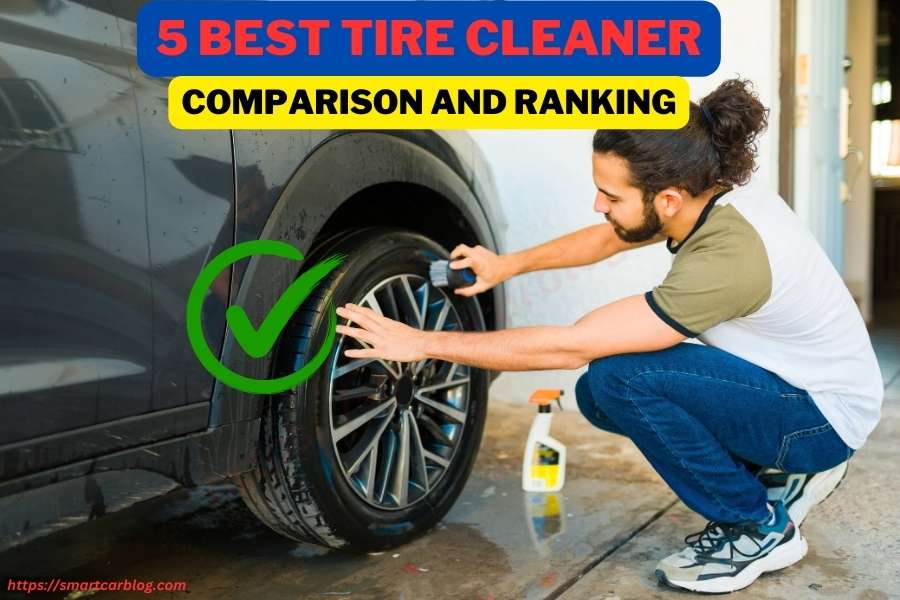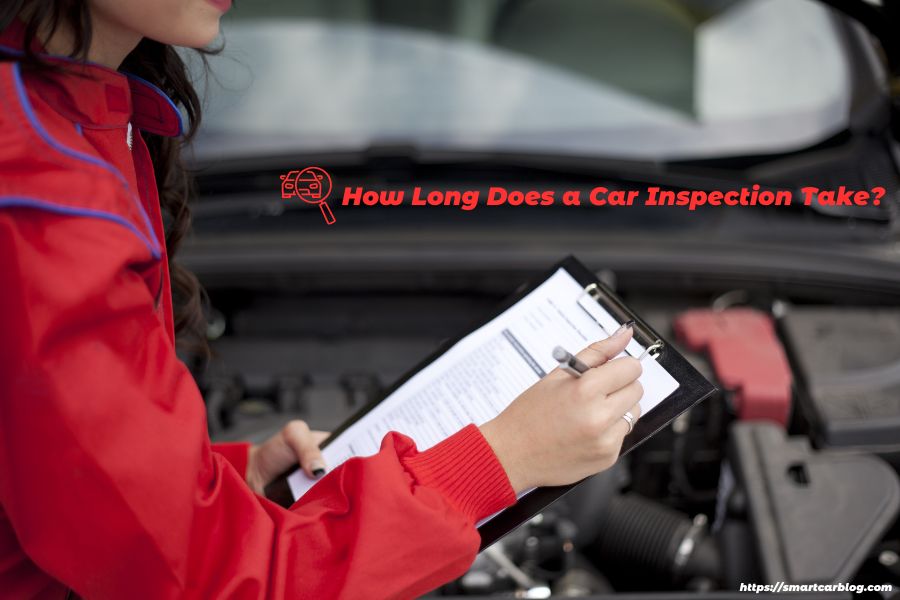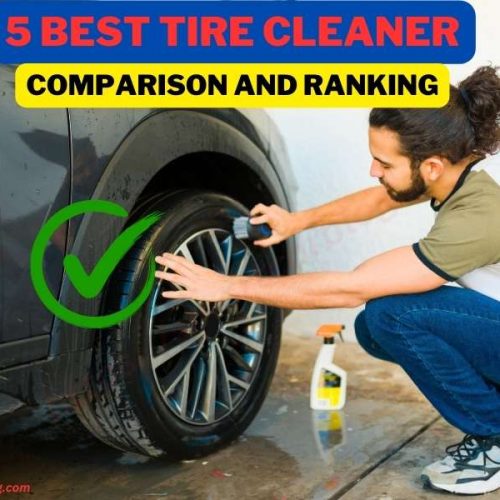If you’re a vehicle owner, driver, or mechanic, at some point, you’ll likely need to know how long a car inspection takes?. Maybe you’ve heard horror stories of hours-long waits in the auto shop for a routine inspection –but how true are those tales? Car inspections don’t have to be time-consuming and stressful!
This comprehensive guide is here to help explain the process so that you’re informed and prepared. We’ll cover the differences between different types of inspections, what factors can influence timing, and tips for getting through your next car inspection as quickly as possible. Read on to become an expert so that inspecting your next car is a breeze!
Table of Contents
ToggleWhat is a Car Inspection?
A car inspection is a crucial process conducted by certified professionals to ensure a vehicle’s optimal performance, safety, and adherence to emission regulations. They examine the vehicle’s critical systems, including the engine, brakes, lights, tires, exhaust system, steering, suspension, and other components to detect any possible issues.
There are different types of car inspections, with each serving a unique purpose. Routine maintenance inspections are regular checks to keep your car in top shape, prevent unexpected breakdowns, and extend its lifespan. Pre-purchase inspections are comprehensive evaluations before buying a used car to uncover hidden problems. Then, there are safety inspections and emission tests mandated by law in many regions to ensure your vehicle is safe to drive and meets environmental standards.
Understanding these types of inspections and their specificities is key to knowing when to schedule them and how to prepare, ensuring a smooth and efficient process.
The Different Types of Car Inspections
Car inspections are essential checks to ensure the safety, functionality, and legality of vehicles. The different types of car inspections include:
👉 Pre-purchase Inspections: This inspection is performed when considering buying a used car. It assesses the vehicle’s condition, performance, and safety, providing a comprehensive overview of its actual state and thereby validating or contradicting the claims made by the seller.
👉 Routine Safety Inspections: Some states or countries mandate these inspections, typically performed annually or biennially. They aim to confirm whether a vehicle meets the requisite safety standards the jurisdiction sets, with inspections covering elements like brakes, tires, lights, and steering systems.
👉 Emissions Inspections: These inspections are crucial for environmental conservation, checking whether a vehicle’s emissions fall within the legal limits of environmental protection regulations. An emissions inspection can help identify issues with the exhaust system that might require repairs.
👉 Post-accident Inspections: Conducted after a vehicle has been involved in an accident, these inspections assess the extent of damage, structural integrity, and safety of the vehicle moving forward. They are crucial in determining the necessary repairs and whether the vehicle is still roadworthy.
Note: In all these inspections, different car parts, such as the engine, exhaust system, and other crucial components, are thoroughly checked.
👉DIY vs Professional Inspections
While some basic inspections can be done at home, it’s advisable to have professional mechanics conduct thorough assessments periodically. DIY inspections are limited in scope and may not catch all potential issues. Certified mechanics have the expertise and tools to perform comprehensive inspections, ensuring nothing goes unnoticed.
👉Seasonal Inspections
In addition to regular inspections, it’s essential to consider seasonal inspections, especially before harsh weather conditions. For example, before winter sets in, thoroughly check your vehicle’s heating system, tires, and battery to ensure they can handle cold temperatures. Similarly, before summer heat intensifies, inspect your air conditioning system and cooling components for optimal performance.
👉Hybrid and Electric Vehicle Inspections
Hybrid and electric vehicles have unique technologies and systems requiring specialised inspections. These inspections focus on battery health, electric motor performance, and energy efficiency. If you own a hybrid or electric vehicle, find a mechanic experienced in handling such vehicles.
Must Read: How to start a car with a bad starter: 7 expert techniques!
The Purpose of a Car Inspection
Car inspections serve various crucial purposes in maintaining vehicle safety, compliance with regulations, and performance:
⇒ Vehicle Safety: One of the primary purposes of a car inspection is to ensure the vehicle’s safety. This involves checking the car’s crucial systems, such as brakes, tires, lights, and steering systems, to prevent potential accidents caused by mechanical failures.
⇒ Regulatory Compliance: In many jurisdictions, periodic car inspections are legally required to ensure that vehicles meet specific safety and emission standards. Failure to comply can result in fines, penalties, or even the revocation of vehicle registration.
⇒ Pre-purchase Evaluation: A pre-purchase inspection can provide an unbiased assessment of a vehicle’s condition for used car buyers. This helps buyers make informed decisions and avoid potential future repairs and problems.
⇒ Post-Accident Assessment: After an accident, a car inspection can determine the extent of damage and the necessary repairs. It also helps evaluate the vehicle’s safety and roadworthiness after repairs.
⇒ Environmental Responsibility: Emissions inspections ensure vehicles are not excessively contributing to air pollution, promoting environmental responsibility among vehicle owners. They identify problems in the exhaust system that can lead to increased emissions.
Car inspections are essential for maintaining safe, legally compliant, and environmentally friendly vehicles.
How Long Does a Car Inspection Take?
A car inspection is a systematic process that assesses a vehicle’s condition and performance. The duration of this process varies depending on the inspection’s nature and the overall state of the vehicle. Let’s break it down:
👉 Comprehensive Vehicle Inspection: This thorough evaluation includes key components such as the engine, transmission, braking system, tires, steering, and exhaust system. On average, it takes around one to two hours. Ensuring a detailed examination promotes longevity, safety, and compliance.
👉 Routine Inspections: These simpler checks focus on basic safety and emissions tests. Usually, they are completed within 30 minutes to an hour. It’s a great way to ensure your vehicle meets safety standards efficiently.
Note: Several factors can affect inspection time, including the age, model, prior maintenance history, and inspection thoroughness. Allocating enough time for an inspection ensures a comprehensive evaluation that enhances your vehicle’s longevity and safety while ensuring regulatory compliance.
Factors Affecting Inspection Duration
Various factors can influence the duration of a car inspection. Here are some of the main elements that can impact how long an inspection might take:
⇒ Type of Inspection: The scope and purpose of the inspection play a significant role. A routine safety check or emissions test may take less than an hour, while a comprehensive pre-purchase or post-accident inspection can last one to two hours.
⇒ Vehicle Condition: The vehicle’s current state affects the inspection’s length. A well-maintained car may require less inspection time than one with evident wear and tear or multiple mechanical issues.
⇒ Vehicle Age: Older vehicles might need a more thorough inspection due to potential age-related issues, thus taking more time. Conversely, newer models typically have fewer problems and may require less time for inspection.
⇒ Vehicle Model: Some complex luxury or specialty vehicles may take longer to inspect due to their unique features and components.
⇒ Inspection Thoroughness: The level of detail in an inspection can influence the duration. A meticulous, in-depth inspection will take longer than a basic overview.
While general time estimates can be provided, the actual duration of a car inspection can be affected by various factors, emphasising the need to allocate sufficient time for this important process.
Must Read: Why Does My Car Shake When I Brake? You Need To Know Everything!
The Importance of Regular Car Inspections
Regular car inspections are essential for optimal performance, safety, and longevity. They offer a proactive approach to vehicle maintenance, ensuring that potential issues are identified and resolved before they become more serious and expensive problems. In addition, these inspections help your vehicle comply with local safety and emission regulations, avoiding any legal hassle or potential fines.
Regarding safety, consistent checks of crucial components like brakes, tires, lights, and steering systems significantly prevent accidents caused by mechanical failures. Moreover, regular emissions inspections support environmental responsibility by ensuring your vehicle meets acceptable emission limits.
But that’s not all! Regular inspections also provide a reliable record of your vehicle’s condition and maintenance history. This can be particularly valuable when selling your car, as it enhances its value and appeal to potential buyers.
Remember to consider the importance of regular car inspections! They are a fundamental aspect of responsible vehicle ownership, granting you peace of mind and contributing to safer roads for everyone.
Efficient Scheduling for Car Inspections
Efficient scheduling for car inspections is a crucial aspect of vehicle maintenance that can ensure the process is seamless and convenient. First and foremost, it’s important to be aware of your vehicle’s inspection requirements. Regulatory standards can dictate the vehicle’s age and maintenance history.
Once you have determined the necessary inspections, you can schedule them during periods of reduced usage or when you have alternative transportation options. Early morning appointments are often beneficial for routine inspections as workshops are less likely to be congested, leading to more timely service.
Furthermore, scheduling inspections well in advance can also provide flexibility to accommodate any unexpected repairs that might arise during the inspection. Consistent communication about your schedule with your mechanic or inspection service can further streamline the process. By proactively managing your inspection schedule, you can maintain your vehicle’s optimal performance and safety while minimizing disruption to your daily routine.
Choosing the Right Inspection Center
Selecting a reputable inspection center is essential to get accurate and reliable results. Look for a facility authorized and certified by your state or local government to perform inspections. Review reviews and ask for recommendations to choose a trustworthy and knowledgeable mechanic.
Failing an Inspection
In the unfortunate event that your car fails an inspection, don’t panic. Failing an inspection doesn’t necessarily mean your vehicle is beyond repair. Often, it may require minor adjustments or replacements to meet the necessary standards. Work closely with your mechanic to address the issues and reattempt the inspection promptly.
After the Inspection
Once your vehicle has passed the inspection, ensure you receive a detailed assessment report. This report will outline the condition of various components, any necessary repairs or maintenance, and recommendations for future inspections. Keep this report for future reference and to track your car’s health over time.
Tips to Expedite the Inspection Process
While it’s crucial not to rush a car inspection, some actions can help streamline the process and make it more efficient. Here are a few tips to expedite the inspection process:
👉 Maintenance Records: Keep a detailed record of your vehicle’s maintenance history, including oil changes, tire rotations, and any repairs or replacements. Providing this information to the inspector can save time spent diagnosing potential issues.
👉 Clean Vehicle: A clean vehicle, inside and out, can make the inspection process quicker and more efficient. Excessive dirt or clutter might hide potential problems and slow down the inspection.
👉 Early Appointment: Schedule your inspection appointment early in the day. Inspectors will likely be more efficient in the morning, and any unforeseen issues can be addressed within the day.
👉 Pre-Inspection Check: Perform a basic pre-inspection check. Ensure that lights, wipers, horns, and other easily accessible features function properly. Addressing these simple issues beforehand can save time during the actual inspection.
👉 Use a Trusted Mechanic: Using a mechanic or inspection service you trust and have a relationship with can expedite the process. They will be familiar with your vehicle and its history, reducing the time spent on diagnostics.
Remember, an inspection aims to ensure your vehicle is safe and reliable. While these tips can help speed up the process, thoroughness and accuracy should always be maintained.
Legal and Financial Consequences
Neglecting to have your vehicle inspected regularly can lead to legal and financial consequences. Driving without a valid inspection certificate can result in fines and penalties in regions with mandatory inspections. Moreover, an unchecked issue in your vehicle may escalate into a more severe problem, leading to costly repairs.
Stay Informed and Stay Safe
Responsible car owners must stay informed about car inspections and their significance. Regularly check your state or local inspection regulations and adhere to the specified timelines. Stay proactive with maintenance and address any potential issues promptly. By doing so, you not only ensure your safety and the safety of others on the road but also extend the life and efficiency of your vehicle.
Car Inspections: Key Takeaways
Car inspections are indispensable to responsible vehicle ownership, ensuring safety, performance, and regulatory compliance. They encompass various types, from pre-purchase and post-accident inspections to routine safety and emissions checks, each serving a unique purpose.
The duration of these inspections can vary depending on numerous factors, including the vehicle’s condition, age, and model. While taking your time with this process is important, efficient scheduling and good vehicle upkeep can help streamline it.
Regular car inspections offer several benefits, such as proactive maintenance, accident prevention, legal compliance, and preserving a vehicle’s value. In essence, car inspections contribute significantly to road safety and the longevity and reliability of vehicles, making them a critical aspect of automotive care.
FAQs
How long do most car inspections take?
Comprehensive car inspections typically take one to two hours, while simpler routine inspections can be completed in 30 minutes to an hour.
What is the inspection fee?
Inspection fees vary by location and type of inspection. Basic safety inspections may range from $10 to $30, while more comprehensive inspections can cost $100 to $200 or more. Always check with your local inspection centre for exact costs.
What is a safety inspection?
A safety inspection thoroughly evaluates a vehicle’s condition to ensure it meets required safety standards and regulations.
How long does NY car inspection take?
A vehicle safety inspection in New York State typically takes 30 minutes to an hour. However, this duration can vary based on factors such as the vehicle’s condition, the inspection station’s business, and if any issues need addressing during the inspection. It’s recommended to allow extra time for potential unexpected delays.
Can you drive in PA without inspection?
Driving in Pennsylvania with a valid inspection is legal. A valid inspection sticker is required to drive a vehicle in the state. Please check with the Pennsylvania Department of Transportation for the most up-to-date information on vehicle inspection regulations.
Can I drive my car while waiting for the inspection?
In most cases, yes. However, it’s best to check with your local regulations to be certain. Some regions may require you to wait until the inspection is complete.
How often should I get my car inspected?
The frequency of inspections can depend on the state’s requirements, your car’s age, and usage. However, a good rule of thumb is to have an annual inspection.
Can I get a fine for not inspecting my car?
Not getting your car inspected when required can lead to fines and other penalties depending on local laws.
What happens if my car fails the inspection?
If your car fails the inspection, the necessary repairs must be done, and the car must be re-inspected before it can be legally driven.
Can I perform the car inspection myself?
While you can perform basic maintenance tasks yourself, professional car inspections should be left to licensed mechanics to ensure comprehensive and accurate results.
Conclusion
Understanding how long a car inspection takes is an important part of being a responsible car owner and driver. Different states have their own rules and regulations regarding inspections, so be sure to research your local laws before booking an appointment – the last thing you want is to end up paying more than necessary or, even worse, having to wait longer for your results. Researching and understanding the process brings peace of mind that everything on the vehicle will get checked properly.
Remember: proactive prevention against costly repairs should always be priority number one! So don’t delay! Book that appointment now so you can get back on the road worry-free.




 Welcome to SmartCarBlog.com! I’m Rashel Miajee, The proud founder of smartcarblog.com. This is a part of
Welcome to SmartCarBlog.com! I’m Rashel Miajee, The proud founder of smartcarblog.com. This is a part of 


